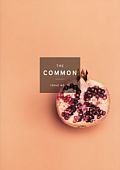Totem
Corby, England, 1972
What was so terribly frightening
about the dark wood elephant headsthat hung in my grandfather’s hall,
tusks aligned, trunks slightly upturnedat the end, as if signaling luck—?
Why was it that I could see nothingauspicious in these ornaments passed on
from some outpost or tourist destination,a memory-mirage of herds staking out
a silt-green watering hole? Veterans ofheavy labor, of human wars and menageries,
our zoo-caged “ambassadors of the species”sway and shuffle through a single acre,
signaling their stress and boredom. Even insanctuaries, keepers find their charges
turn rogue or run away, great hoovescommanding seismic waves, herd-peace
punctuated by hit-squads or the hum of heat-seeking shepherd drones. But I knew none
of this—I just had to summon nerveeach time I climbed the stairs and passed
beneath the still gaze of that uncannypair, captives in an English steel town
spruced up by roses and the rain.
Feature Date
- May 18, 2018
Series
Selected By
Share This Poem
Print This Poem
Copyright © 2018 by Jane Satterfield
All rights reserved.
Reproduced by Poetry Daily with permission
Jane Satterfield has received awards in poetry from the NEA, Bellingham Review, Ledbury Poetry Festival, Mslexia, and more. Her books of poetry are Her Familiars, Assignation at Vanishing Point, Shepherdess with an Automatic, and Apocalypse Mix, winner of the 2016 Autumn House Poetry Prize. She is married to poet Ned Balbo and lives in Baltimore.

Issue 15
Amherst, Massachusetts
Amherst College
Editor in Chief
Jennifer Acker
Poetry Editor
John Hennessy
Managing Editor
Emily Everett
Finding the extraordinary in the common has long been the mission of literature. Inspired by this mission and the role of the town common, a public gathering place for the display and exchange of ideas, The Common seeks to recapture an old idea. The Common publishes fiction, essays, poetry, documentary vignettes, and images that embody particular times and places both real and imagined; from deserts to teeming ports; from Winnipeg to Beijing; from Earth to the Moon: literature and art powerful enough to reach from there to here. In short, we seek a modern sense of place.
In our hectic and sometimes alienating world, themes of place provoke us to reflect on our situations and both comfort and fascinate us. Sense of place is not provincial nor old fashioned. It is a characteristic of great literature from all ages around the world. It is, simply, the feeling of being transported, of “being there.” The Common fosters regional creative spirit while stitching together a national and international community through publishing literature and art from around the world, bringing readers into a common space.
Poetry Daily Depends on You
With your support, we make reading the best contemporary poetry a treasured daily experience. Consider a contribution today.



